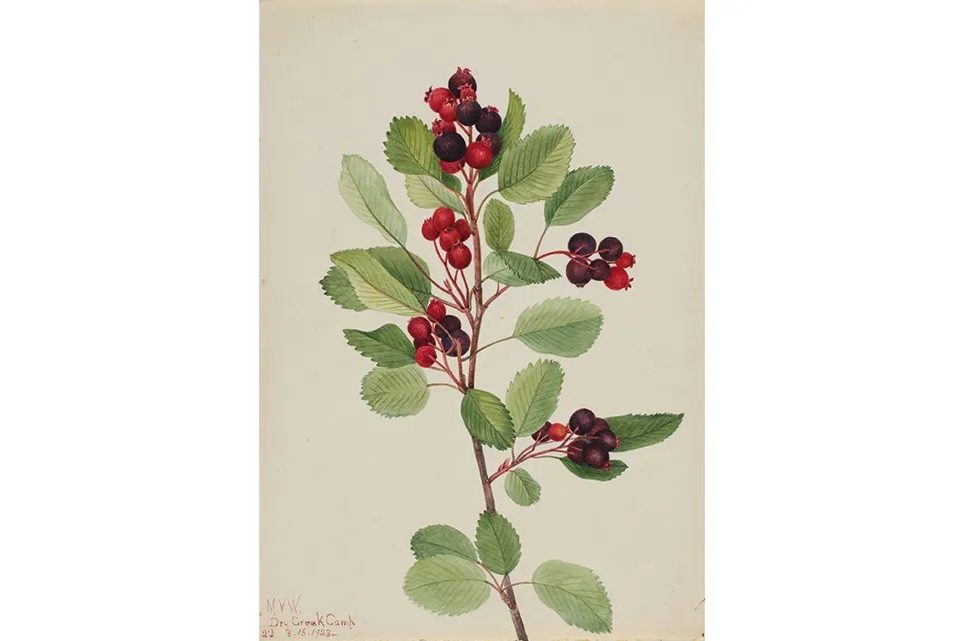Life on Earth is not a zero-sum affair. Most plants only exist thanks to partnerships with fungal filaments in the soil which mobilize essential nutrients for them and receive sugars made from sunlight in exchange. Without those partnerships, humans and most other land animals which depend on plants either directly or at one or two removes would not exist. Cooperation gives rise to a living world that is vastly more complex, productive and beautiful than the sum of its parts.
An understanding of this reality is one of the key insights of an ecological worldview; and, argues Robin Wall Kimmerer in this short and charming book, it is of vital relevance when thinking about how human societies and individuals might organize, and think differently and more expansively about the future.
For Kimmerer, the serviceberry is an instance and object lesson. This tree (a North American cousin to the rowan that derives its name from Sorbus, the scientific name for the family of which both are members) provides food in superfluity to both humans and other animals. In spring it is a source of pollen for newly emerging insects. In autumn it produces delicious fruits. Bozakmin, the Native American name, means “the best of berries.” “Imagine,” writes Kimmerer, “a fruit that tastes like a blueberry crossed with the satisfying heft of an apple, a touch of rosewater, and a minuscule crunch of almond-flavored seeds.” The serviceberry thrives in a mutual relation with other life forms which spread its pollen and seeds as well as consume them.
A biographical note describes Kimmerer as a mother, a scientist (she is a botanist), a decorated professor and a member of the Potawatomi Nation, who are one of the Anishinaabe peoples of the Great Lakes region. She is probably best known for Braiding Sweetgrass, a collection of essays that marries precise scientific observation with insights that draw on First Nations myth and philosophy in a distinctive and generous voice. The book topped the New York Times bestseller list when it was published in 2013, and continues to be widely read, cited and celebrated. The Serviceberry continues in the spirit of the earlier work, but with a focus on the question of what economics is for.
For the predominant view, Kimmerer turns to the American Economic Association, who have defined economics as “the study of scarcity… how people use resources and respond to incentives.” The problem with this, she argues, is that “with scarcity as a main principle, the mindset that follows is based on commodification of goods and services.” Instead, she prefers a framing offered by Valeria Luzadis, a past president of the US Society of Ecological Economics, who defines economics as “how we organize ourselves to sustain life and enhance its quality. It’s a way of considering how we provide for ourselves.”
This second approach, Kimmerer argues, provides the most scope for human flourishing. The emphasis is on recognizing and celebrating “enoughness” in a web of connections that increases the reach for a gift economy, “where wealth is understood as having enough to share.” The currency in this kind of economy, she says, is “relationship, which is expressed as gratitude, as interdependence and the ongoing cycles of reciprocity… All flourishing is mutual.”
Kimmerer bolsters her case with the thinking and analysis of European and Euro-American writers and theorists. Lewis Hyde’s seminal work The Gift and Charles Eisenstein’s Sacred Economics are marshaled, along with the work of the Nobel prize-winning economist Elinor Ostrom, which showed that land can sustain resources held in common without either state intervention or market economies, and the “Donut Economics” championed by Kate Raworth, which explores the scope for human flourishing within planetary boundaries. A central place, however, is given to the indigenous philosophy of the “Honorable Harvest,” a set of guidelines intended to limit consumption “to ensure the dish remains full” with “protocols of restraint, respect and reciprocity.”
The Serviceberry does not pretend to have all the answers to the questions it poses. Kimmerer does not suggest the market economy can or should be replaced any time soon, though she would surely welcome constraints on actors who behave like the Windigo monster in Potawatomi culture by taking too much and sharing too little. What the book does do is light a candle rather than curse the darkness. Kimmerer asks:
What would it be like to consume with the full awareness that we are the recipients of earthly gifts, which we have not earned?. Imagine we create the social and political climate to serve the ‘empathic mutualist human.’ I mean, why not?





















